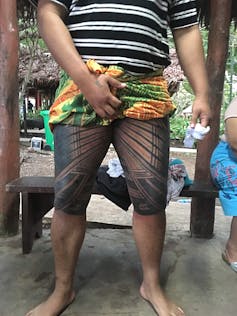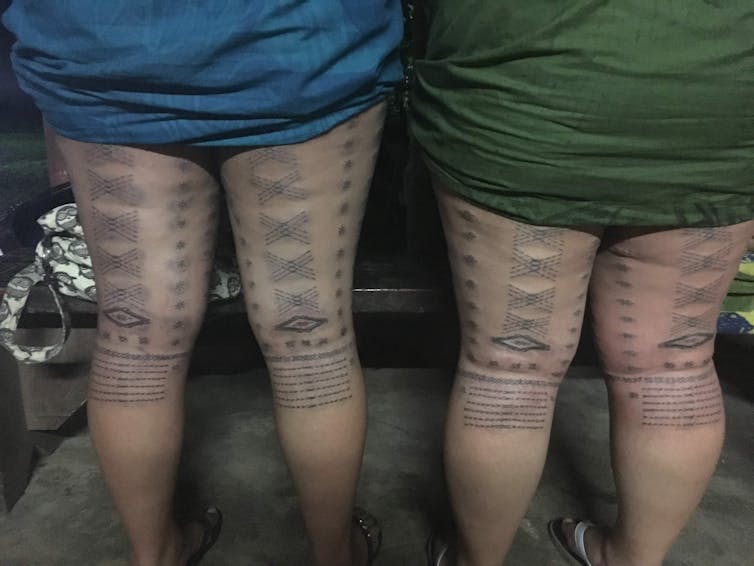Untangling tattoos' influence on immune response
- Written by Christopher D. Lynn, Associate Professor of Anthropology, University of Alabama
I lay on the mat of the open-air bungalow in Apia, Samoa, looking up at a gecko. As its tail quivered, I felt a sympathetic twitch in my leg. Su’a Sulu’ape Paulo III, the sixth-generation Samoan hand-tap tattoo master leaning over me, paused to see if my movement was due to pain.
I’d been in Samoa for a month, studying Samoan tattooing culture and the impact of the big traditional pieces called pe’a and malu – tatau in general – on the immune system. Now I was getting my own hand-tapped leg tattoo, albeit considerably smaller.
This field season was the fourth of my research on the relationship between tattooing and immune response. My first study had focused on a small sample, mostly women, in Alabama. What I’d observed among that group suggested[1] that tattooing could help beef up one’s immune response[2].
But one small study[3] in the United States wasn’t proof of anything – despite headlines blaring that tattoos could cure the common cold. Good science means finding the same results multiple times and then interpreting them to understand something about the world.
That’s why I traveled in 2018 with fellow anthropologist[4] Michaela Howells[5] to the Samoan Islands. Samoans have a long, continuous history of extensive tattooing. Working with contemporary machine and hand-tap tattooists in American Samoa, we wanted to see if we’d find the same link to enhanced immune response.
Slow motion video of Su'a Sulu'ape Paulo III hand-tapping a tatau. Filmed by Adam Booher.Immune defenders rush to tattoo’s tiny wounds
More than 30% of Americans[6] are tattooed today. Yet, few studies have focused on the biological impact beyond risks of cancer[7] or infection[8].
Tattooing creates a permanent image by inserting ink into tiny punctures under the topmost layer of skin. Your body interprets a new tattoo as a wound and responds accordingly[9], in two general ways.
Innate immune responses involve general reactions to foreign material. So getting a new tattoo triggers your immune system to send white blood cells called macrophages to eat invaders[10] and sacrifice themselves to protect against infection.
Your body also launches what immunologists call adaptive responses. Proteins in the blood will try to fight and disable specific invaders that they recognize as problems. There are several classes of these proteins – called antibodies or immunoglobulins – and they continue to circulate in the bloodstream[11], on the lookout lest that same invader is encountered again. They’re at the ready to quickly launch an immune response the next time around.
This adaptive capacity of the immune system means that we could measure immunoglobulins in saliva as approximations of previous stress caused by tattooing.
In American Samoa, Howells and I worked at the Historic Preservation Office[12] to recruit study participants with help from tattoo artists Joe Ioane of Off Da Rock Tattoos[13], Duffy Hudson of Tatau Manaia[14] and traditional hand-tap tattooist Su'a Tupuola Uilisone Fitiao. Our sample of 25 tattoo recipients included both Samoans and tourists to the island.
 Chris Lynn collecting data in American Samoa.
Michaela Howells, CC BY-ND[15][16]
Chris Lynn collecting data in American Samoa.
Michaela Howells, CC BY-ND[15][16]
We collected saliva at the start and end of each tattoo session, controlling for the tattoo duration. We also measured recipients’ weight, height and fat density to account for health. From the saliva samples, we extracted the antibody immunoglobulin A, as well as the stress hormone cortisol and inflammatory marker C-reactive protein. Immunoglobulin A[17] is considered a frontline immune defense and provides important protections against frequent pathogens like those of the common cold.
By comparing the levels of these biological markers, we determined[18] that immunoglobulin A remains higher in the bloodstream even after tattoos heal. Furthermore, people with more time under the tattoo needle produced more salivary immunoglobulin A, suggesting an enhanced immune response to receiving a new tattoo compared to those with less or no tattoo experience. This effect appears to be dependent on receiving multiple tattoos, not just time passed since receiving one. This immune boost may be beneficial in the case of other skin injuries[19] and for health in general[20].
Tattooing seems to exert a priming effect: That’s what biologists call it[21] when naive immune cells are exposed to their specific antigen and differentiate into antibodies that remain in the bloodstream for many years. Each tattoo prepares the body to respond to the next.
Other studies find that short-term stress benefits[22] the immune system. Stress’s bad rap comes from chronic forms that really do undermine[23] immune response and health. But a little bit is actually good for you and prepares your body to fight off germs. Regular exercise provides immune function benefits through repetition[24], not necessarily single visits to the gym. We think this is similar to how each tattoo seems to prepare the body for vigilance.
Our Samoan findings supported the results of my first study in Alabama. But of course correlation does not imply causation. Enhanced immune response is correlated with more tattoo experience, but maybe healthier people heal easily from tattooing and like to get them more. How could we find out if getting tattoos could actually make a person healthier?
‘Tatau belongs to Samoa’
Samoans have the oldest continuous tattoo culture[25] in the Pacific Islands. Though many Samoans complain that young people are getting tatau for fashion, most get them to honor their heritage, saying their tattoo belongs not to them but to Samoan culture.
 A pe'a by Sulu'ape Tatau will mostly be hidden, visible only on ceremonial occasions.
Christopher Lynn, CC BY-ND[26]
A pe'a by Sulu'ape Tatau will mostly be hidden, visible only on ceremonial occasions.
Christopher Lynn, CC BY-ND[26]
Samoans usually obtain permission from family to receive pe'a and malu. Getting and wearing these tattoos involve many responsibilities and indicate willingness to serve one’s community.
Several of the Samoans in our sample had little interest in getting other tattoos, and one even reported being afraid of needles. They get pe'a and malu for the importance of these tattoos to their cultural identity, not because they are fashionable ways to show off. The social expectations for Samoans mean that getting pe'a or malu is less about self-motivated fashion choices than getting a tattoo is in the U.S. This is why Samoa is a great place to investigate whether the immune bump we see after tattooing is due to healthier people going under the needle in the first place – in Samoa people of all body types and walks of life get them, from priests[27] to politicans[28].
In July 2019 I focused on collecting multiple biological samples from people getting intensive tattoos in Apia, where they are administered daily in the center of town. I collected around 50 saliva samples from a dozen participants that will be analyzed in the coming year by anthropological immunologist[29] Michael Muehlenbein[30].
 Two sisters display their malu, by Sulu'ape Tatau.
Christopher Lynn, CC BY-ND[31]
Two sisters display their malu, by Sulu'ape Tatau.
Christopher Lynn, CC BY-ND[31]
An evolutionary take on tattoos
Tattoos may provide[32] visual evidence that others home in on to identify healthy mates[33] or hardy friends. Such signals of fitness have been compared to peacock tail feathers, which would be too much of a burden if the peacock were not hale enough to escape predators.
Even in the modern environment with improved health care, tattoos may “up the ante[34]” by artificially injuring the body to demonstrate health. In a study I conducted among nearly 7,000 undergraduates[35], male intercollegiate athletes in general and football players in particular were more likely to be tattooed than nonathletes and less likely to suffer tattoo-related medical problems than those nonathletes who were tattooed.
It’s not clear that the benefits tattooing provides are big enough to make a clinical difference on health, so don’t expect a new tattoo to cancel out a diet of cheeseburgers and fries. But there is no doubt that tattooing is associated with toughness, and that we humans influence each other through impressions as much as reality.
[ Deep knowledge, daily. Sign up for The Conversation’s newsletter[36]. ]
References
- ^ observed among that group suggested (doi.org)
- ^ tattooing could help beef up one’s immune response (www.sciencedaily.com)
- ^ one small study (jezebel.com)
- ^ fellow anthropologist (scholar.google.com)
- ^ Michaela Howells (scholar.google.com)
- ^ 30% of Americans (www.historyoftattoos.net)
- ^ cancer (link.springer.com)
- ^ infection (doi.org)
- ^ responds accordingly (doi.org)
- ^ eat invaders (newatlas.com)
- ^ circulate in the bloodstream (doi.org)
- ^ Historic Preservation Office (www.ashpo.org)
- ^ Off Da Rock Tattoos (www.facebook.com)
- ^ Tatau Manaia (www.facebook.com)
- ^ Michaela Howells (www.facebook.com)
- ^ CC BY-ND (creativecommons.org)
- ^ Immunoglobulin A (doi.org)
- ^ we determined (www.researchgate.net)
- ^ other skin injuries (doi.org)
- ^ health in general (doi.org)
- ^ what biologists call it (doi.org)
- ^ short-term stress benefits (doi.org)
- ^ really do undermine (www.simplypsychology.org)
- ^ benefits through repetition (doi.org)
- ^ oldest continuous tattoo culture (uhpress.hawaii.edu)
- ^ CC BY-ND (creativecommons.org)
- ^ priests (www.sapiens.org)
- ^ politicans (www.samoanews.com)
- ^ anthropological immunologist (www.baylor.edu)
- ^ Michael Muehlenbein (scholar.google.com)
- ^ CC BY-ND (creativecommons.org)
- ^ Tattoos may provide (doi.org)
- ^ identify healthy mates (doi.org)
- ^ up the ante (doi.org)
- ^ nearly 7,000 undergraduates (doi.org)
- ^ Sign up for The Conversation’s newsletter (theconversation.com)
Authors: Christopher D. Lynn, Associate Professor of Anthropology, University of Alabama
Read more http://theconversation.com/untangling-tattoos-influence-on-immune-response-121852

